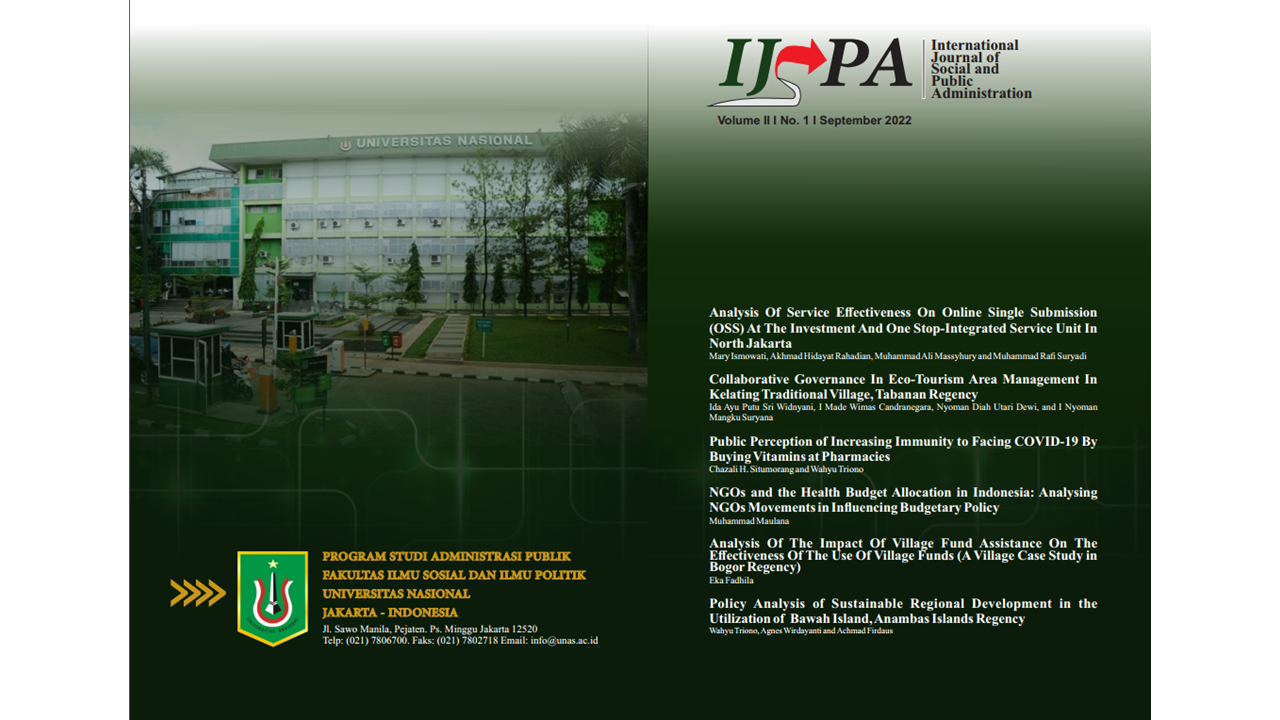Public Perception of Increasing Immunity to Facing Covid-19 By Buying Vitamins at Pharmacies
Abstract
In the face of the Covid-19 pandemic, the community really needs to make prevention efforts by increasing immunity. Public perception about the importance of increasing immunity by consuming vitamins purchased at pharmacies. With the research location in Budi Farma Pharmacy, Jatijajar Depok. This study was analyzed based on variables consisting of three indicators based on three perceptual theories, including: Attribution theory (Kelly) in (Slamet Santoso, 2010:254), Correspondent Inference Theory (Taylor, Shelly and David, translation by Tri Wibowo, 2009: 57) and Covariation Theory (Taylor et al translation by Tri Wibowo, 2009:59). This study aims to find out how the human body's defense system works under normal conditions and conditions of being attacked by a virus, to determine the public perception of increasing immunity in the face of Covid-19 by consuming vitamins purchased at pharmacies, to determine the factors that affect the immune system, as well as food, drinks or drugs that can beused to increase immunity that are packaged into various products sold in pharmacies
References
Badan Pengawas Obat dan Makanan. (2020), Selenium, Buku Saku Suplemen Kesehatan Untuk Memelihara Daya Tahan Tubuh Dalam Menghadapi COVID-19. Badan pengawas Obat dan Makanan Republik Indonesia, Jakarta.
Direktorat Kesehatan dan Gizi Masyarakat Bappenas dan FKM UI, 2020. Studi Pembelajaran Penanganan COVID-19 Indonesia. Kementerian Perencanaan Pembangunan Nasional/Badan Perencanaan Pembangunan Nasional (BAPPENAS), Jakarta.
Hanurawan, Fattah. (2010). Psikologi Sosial: Suatu Pengantar. Bandung. PT. Remaja Rosdakarya, Bandung.
Janti Sudiono, (2004). Sistem Kekebalan Tubuh. Penerbit Buku
Kedokteran EGC, P.O. Box 4276/Jakarta.
Kelompok Kerja Komunikasi Risiko dan Pelibatan Masyarakat COVID-19. (2020). Persepsi Masyarakat Terhadap COVID-19. Suara Komunitas Edisi Pertama, Agustus 2020, Jakarta.
Novita Sari, Zihan. (2020), Tetap Bugar Walaupun Di Rumah Saja Untuk Melawan Virus COVID-19. Dalam Winarno, Dkk (2020). Bunga Rampai Anak Bangsa. Integrasi Ilmu Keolahragaan Dalam Preventing Pandemi COVID-19. Akademia Pustaka, Tulungagung.
Proboyekti, R. Dhian. (2020). Panduan Gizi Seimbang Pada Masa pendemi COVID-19. Kementerian Kesehatan RI, Jakarta.
Robbins, Stephen P. (2001) “Perilaku Organisasi: Konsep, Kontroversi, dan Aplikasi Edisi Bahasa Indonesia Edisi Kedelapan”. Jakarta: Prehallindo.
Rohmaul Listyana dan Yudi Hartono. (2015). Persepsi dan Sikap Masyarakat Terahadap Penanggalan Jawa Dalam Penentuan Waktu Pernikahan. (Studi Kasus Desa Jongrang Kecamatan Barat Kabupaten Magetan Tahun 2013. Jurnal Agastya Vol. 5 No. 1 Januari 2015.
Safrizal ZA, (2020). Pedoman Umum Menghadapi Pandemi COVID-19
Bagi Pemerintah Daerah Pencegahan, Pengendalian, Diagnosis dan Manajemen.
Tim Kerja Kementerian Dalam Negeri Untuk Dukungan Gugus Tugas COVID-19. Kementerian dalam Negeri, Jakarta.
Safrizal ZA, (2021). Pedoman Manajemen Bagi Pemerintah Daerah Dalam Penanganan COVID-19 dan Dampaknya. Kementerian Dalam Negeri.
Sardjoko, Subandi, (2021). Studi Pembelajaran Penanganan COVID-19 Indonesia. Kementerian Perencanaan Pembangunan Badan Perencanaan Pembangunan Nasional, Jakarta.
Sarlito W Sarwono. (2010). Pengantar Psikologi Umum. Jakarta: Rajawali Pers.
Sasmito, E., Sahid, M.N.A., dan Ikawati, M. (editor), 2020, Buku Petunjuk Praktikum Imunologi Farmasi, Fakultas Farmasi UGM.
Slamet Santoso. (2010). Psikologi Sosial. PT. Refika Aditama, Bandung.
Suharsimi Arikunto. (2010). Manajemen Penelitian, Rineka Cipta, Jakarta.
Published
How to Cite
Issue
Section
License
Authors who publish with this journal agree to the following terms:
- Authors retain copyright and grant the journal right of first publication with the work simultaneously licensed under a Creative Commons Attribution License that allows others to share the work with an acknowledgment of the work's authorship and initial publication in this journal.
- Authors are able to enter into separate, additional contractual arrangements for the non-exclusive distribution of the journal's published version of the work (e.g., post it to an institutional repository or publish it in a book), with an acknowledgment of its initial publication in this journal.
- Authors are permitted and encouraged to post their work online (e.g., in institutional repositories or on their website) prior to and during the submission process, as it can lead to productive exchanges, as well as earlier and greater citation of published work (See The Effect of Open Access).

